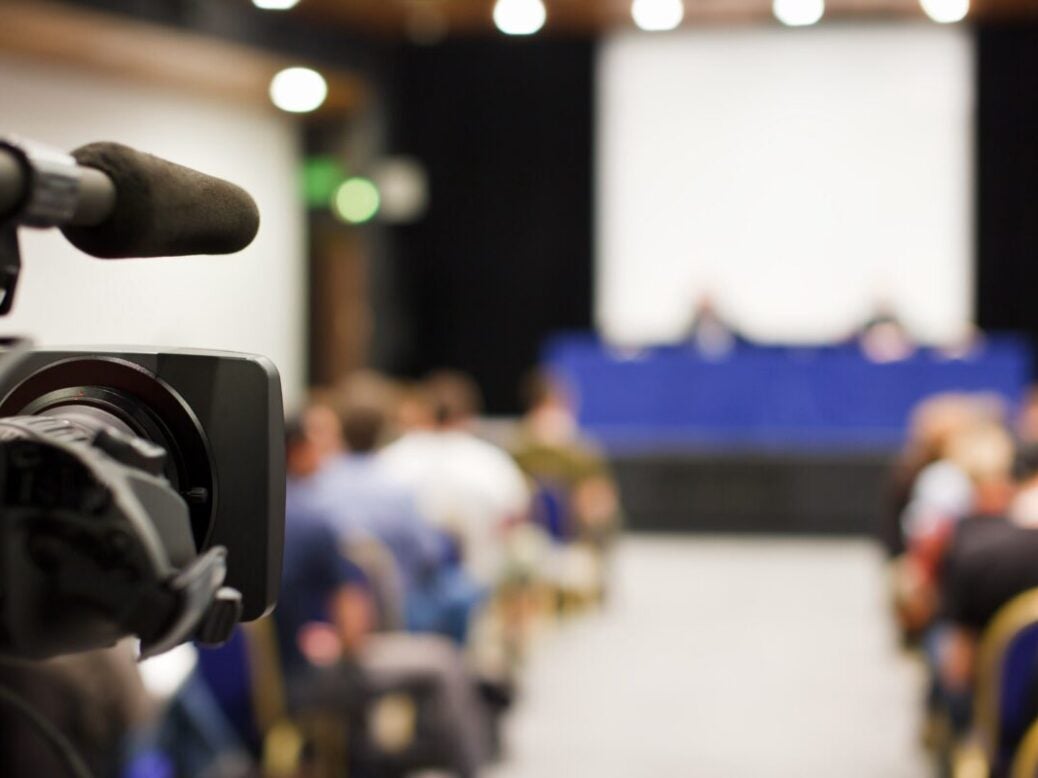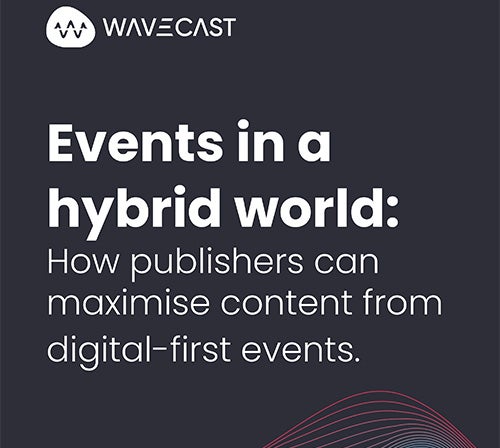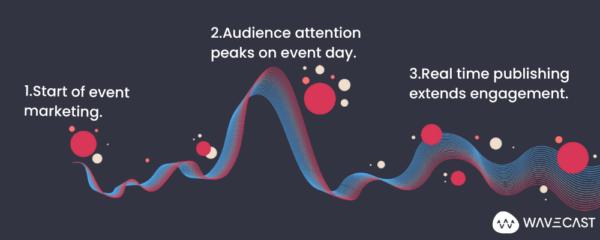
Partner Content*: How to make digital events work and continue to have impact is a challenge publishers have tussled with amid unpredented challenges and transformation in the work of events in the past few years.
As publishers innovate like never before, a growing number align editorial and events teams in order to grow the quality of engagement, increase value for attendees, and even help drive the news cycle.
The rise of hybrid and digital events – not to mention the increased adoption of platforms that can house and elevate all aspects of digital programming – is prompting a closer convergence of the traditionally siloed fields of content and event production.
For publishers who are able to bring these teams together, there are growing opportunities to harness, promote and produce elements such as digital video, thought leadership and expert surveys across multiple channels. While it is a trend that continues to gather pace, for some, the change is long overdue.
Alex Bridges, founder of content tech specialists Wavecast, has been promoting such an approach for more than a decade. In his eyes, it has been the mindset of publishers, more than limitations in technology, that has stymied the pace of change. But the pandemic has not only forced businesses to re-evaluate how they conduct events, it has also led to widespread changes in organisational structure, digital adoption and workflows.
For Bridges, virtual events have given publishers the ability to recognise the benefits of having a digital footprint, especially given the enormous amount of content that they produce. Only through being forced to pivot did they come to see firsthand the amount of content that can be created and shared through embracing digital solutions.
“In a lot of ways, it’s been very refreshing because this has been Wavecast’s area of expertise for a number of years, but even we stumbled into our position through a process of iteration and evolution,” he says. “That is, we used a combination of creative thinking and having the drive to pursue our instincts at a time when it wasn’t popular to do so.
“Now, despite the fact that businesses have seen the benefits of a hybrid approach, they still aren’t necessarily maximising events management as a key extension of content production. Growth demands that decision-makers are open to multiple forms of engagement, and having the ability to carry them off effectively is an intractable business need.”
Content is king
Bridges cautions that there has been a temptation to focus purely on new technology and platforms, and not enough on the integration of content or greater involvement from content teams. The reality, he says, is that content is still king and technology should only ever be there to facilitate its creation and delivery; never to get in the way.
Indeed, the technology central to digital events platforms hasn’t changed that dramatically over the past two years. If anything, the tech has simply evolved to simplify processes and integration as adoption and awareness has grown. Virtual event platforms tend to offer like-for-like features that have enabled publishers to pivot to digital quickly, but, unlike Wavecast, does not provide the services and tools for converting event content into marketing, commercial or editorial collateral. Those not taking this last step are still failing to derive maximum value from their events, whether or not they’ve seamlessly pivoted to hybrid or digital.
 Promoted white paper: Events in a hybrid world
Promoted white paper: Events in a hybrid world
Read Wavecast’s 10-page report on events in a hybrid world: It explains how publishers can maximise content from digital-first events.
“A perfect example of a business taking advantage of these possibilities is the Financial Times,” Bridges says of a publisher that, while not a Wavecast client, has adopted an approach that others can emulate. “What they do now is to stream and capture video generated from FT Live and distribute effectively to get the content in front of a wider audience.”
As a prime example, he points to Elon Musk’s keynote interview at FT Live’s Future of the Car summit, held in May of this year. In a wide-ranging discussion, Musk hit upon a number of news-making topics. The keynote was livestreamed, but also used to generate on-demand videos, news and analysis articles, PR efforts and extensive social media assets. “The engineering of event content to work across other channels is the future for event programming,” says Bridges.
According to Bridges, the key to this sort of success is recognising how changes to consumer habits is affecting content production. Before the pandemic, webinars and video content normally took the form of long, lecture-like videos. Now, consumers are demanding something more bite-size and episodic – a trend, Bridges says, influenced by how we consume media more widely.
“When we work with editors now, the advice is always to create a suite of what we refer to as ‘snackable’ videos,” he says. “That is, content of about 15 minutes or less, in the form of fireside chats, webinars – taking more of an episodic approach than pushing everything into maybe an hour-long broadcast. That way you sustain people’s attention and get them coming back for more, whereas with a long video, the temptation might be there to switch off halfway through.

“With this in mind, Wavecast offers a multi-event hub as opposed to just an event website, because we enable recommendations other than just the livestreaming of a virtual event. We offer back-channel communication. We have multiple routes leading into the event itself, which makes marketing and promotions easier. And, when viewers are on the hub, we ensure that there is other, supplemental, related content for them to engage with. You don’t even need to attend the event. Everything is indexed with transcripts and links to related, sometimes gated, content, so discoverability is something we build into the picture from the start.”
Defining value
Because of these changes to consumer attitudes, and of course to the way business is conducted, return on investment (ROI) metrics have also changed. The success of an event used to be judged on the number of seats filled at a live panel or lecture, and now, suddenly, event managers have access to data about their audience they’ve never had before. The key to business success going forward, Bridges says, is learning how to maximise data so that it can be turned into leads, sales and, ultimately, customer retention. Judging success by engagement, rather than delegate numbers, also further aligns the aspirations of editorial and events teams.
In that sense, events should perhaps play a more central role for editorial leaders – even those who have traditionally been reluctant to invest as much time in similar thought-shaping event agendas as they do in managing their publications. Here exists a real opportunity to interact with a captive audience and drive new, exclusive, high-value content for their publications.
“This is where something like a live video extraction tool comes into play,” Bridges says. “It allows you to extract a clip or a comment that is happening in real time. As an editor, it used to be that asking a question, getting a response, and distributing it live or as close to real time as possible was a massive challenge. Now you can create news virtually in real time.
“These tools not only make the editorial work easier, but the conceptualisation and production of content too. This is where event managers, content managers and editors have an opportunity to work together to deliver a more holistic experience for the audience – to get more granular with the stuff their viewers are actually engaged with and start producing assets that are ready-made. If the enthusiasm is already there, the tech to make it happen is the easy part.”
*This article was produced in association with Press Gazette commercial partner Wavecast
Email pged@pressgazette.co.uk to point out mistakes, provide story tips or send in a letter for publication on our "Letters Page" blog
